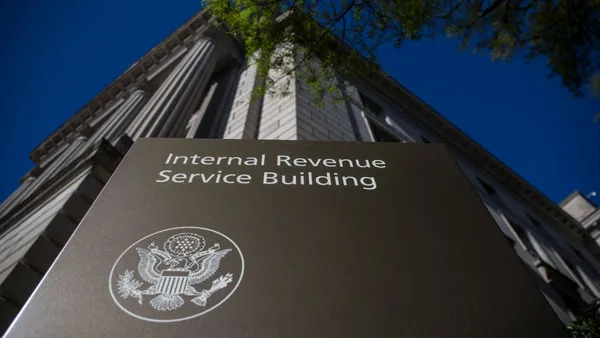Dive Brief:
- Securities class action claims and settlements involving accounting problems are down, a Cornerstone Research analysis shows.
- Plaintiffs filed 46 class actions claims against companies last year for accounting problems – improper revenue recognition, for example. That's the lowest in 10 years and a drop from 70 filings the previous year.
- Separately, 33 accounting-related cases were settled, down from 38 the previous year. Settlement amounts were also down, to $755 million from $3.7 billion. “The decline in accounting case settlement amounts was part of a broader decline for all types of securities class actions settled in 2021,” says Laura Simmons, a senior advisor at the research company.
Dive Insight:
The analysis doesn’t look into what’s causing the drop but one underlying factor could be fewer public company financial reporting restatements, which tend to be a lawsuit trigger.
Cases involving financial restatements dropped 55%, the lowest in a decade and more than 70% lower than over the past eight years.
"Given the overall decline in financial statement restatements by public issuers in recent years, the decline in accounting-related class actions involving restatements is not surprising,” says Frank Mascari, a Cornerstone principal.
The research does not look at what’s behind the drop in restatements but one factor that could be important, at least going forward, is a proposed policy shift by the Securities and Exchange Commission (SEC) last year to pursue more executive clawbacks. The SEC in October dusted off a 2015 policy that would require executives to return performance-based compensation if their company restates its financials, even if the restatement stems from a mistake rather than alleged illegal activity.
Tying restatements to clawbacks even if they’re based on mistakes will likely have the effect of pushing companies to avoid restatements to the extent they can unless they involve small enough amounts not to trigger an SEC review.
“To the extent there are companies on the margins that want to push the envelope, [the clawbacks] would likely be an incentive for them to not issue a restatement when they otherwise might have,” Susan Schroeder, a partner with the law firm Wilmer Cutler Pickering Hale and Dorr LLP, has said.
Because the policy shift wasn’t announced until the third quarter, it would have little or no effect on last year’s numbers but it could be a factor in the future to the extent the SEC is serious about adopting it as a practice.
Special purpose acquisition companies (SPACs) were the one area to see an uptick in cases. Some 20% of accounting-related cases involved SPACs and, in the second half of the year, they were almost a third of all cases.
“Allegations of inappropriate revenue recognition and weaknesses in internal control have been the most common accounting issues in these cases, followed by allegedly omitted disclosure of related-party transactions," said Elaine Harwood, a Cornerstone senior vice president and head of the firm’s accounting practice.












